I travel a lot these days to hug children, to greet staff and to write stories about how Feed the Children’s donors are helping kids have clean water, access to education and more sustainable food sources around the world. Sometimes, I wake up not knowing where I am! But when I figure it out, I want to full present in that space, not somewhere else.
I'm back in United States this week, settling in, remembering, and telling others about my 3 week experience in Tanzania and Kenya. Trying to heed my own advice about being present here now . . .it is hard to do.
I keep thinking about Kenya. There are few words that can describe what happened. It was more profound that just seeing the life-changing work. It was more profound that having my eyes opened to deeper levels of poverty I'd ever seen. It was more profound than entering into the deep waters of relationship with my Kenyan friends and even more profound than being asked to baptize four of the children who are a part of our children's center in Nairobi.
No, this trip gave me a gift that only God could give.
The best words I have come from my songwriting friend, Sara Groves.
Something changed inside me broke wide open all spilled out
Till I had no doubt that something changedNever would have believed it till I felt it in my own heartIn the deepest part the healing cameSomething so amazing in a heart so dark and dimWhen a wall falls down and the light comes inAnd I cannot make it
And I cannot fake it
And I can't afford it
But it's mineSomething changed.





 While recently attending a writing workshop, the presenter offered some advice that hasn't left me since I first heard it. "If you want to write well, if you want to connect with your audience," she offered, "You always must tell the truth. There's nothing that can spoil a good story faster than a character who the readers know is not forthcoming in their words."
While recently attending a writing workshop, the presenter offered some advice that hasn't left me since I first heard it. "If you want to write well, if you want to connect with your audience," she offered, "You always must tell the truth. There's nothing that can spoil a good story faster than a character who the readers know is not forthcoming in their words."
Similarly, when I think of the local church and what its hopeful future means to so many of us, I can't help but think of my writing teacher's advice. In the age of decline, division and discord of modern Protestant life, we also need to tell the truth.
How many times have you heard such whispers in church life: "I am not sure my church is willing to invite a woman to be senior pastor yet" or "Could you please not mention gay people when you come speak at the conference?" or "Could you not bring that loud music into my worship service?"
And then the conversation goes on: "You just don't understand how things are. You can't ask me to change that right now even if I wanted to . . . "
But this is what I wonder: is the real problem our biblical understanding of a women's place in ministry? Is our real problem with what God thinks of gay and lesbian people? Is our real problem standards for what meaningful worship looks like? Or, is this all about what makes us afraid?
This is what I think is true: we are afraid. I know because I was once afraid of all of these things too.
We're afraid of what the church might look like if more women, especially younger women, started preaching from our pulpits, dedicating our babies and baptizing our children. All that estrogen in church council and deacon meetings might just lead us in unknown directions of ministry.
We're afraid of the new paradigm that would come from sermons in higher pitched voices or the need to create pastoral maternity leave policies.
Some of us fear what the church might look like if we openly welcomed gay and lesbian members into our congregation. For, without that "sin" to label as most hated in the eyes of God, we might have to look deeper into our own hearts and see that we too have fallen short of God's best.
We're afraid of how we might feel if we were wrong about God's inclusion policy.
Some of us fear what the church might look like if we lived more authentically with one another. Instead of blaming the change in the church music program for causing a scene at choir practice or making us unhappy, we'd actually be able to say, "My marriage is in trouble," "I don't know how I am going to get through the teenage years with my son" or "I think I am going to lose my job."
We're afraid to let people see the broken parts of us, the parts that make us human.
But, do we want our fears to stunt our growth as communities of faith?
Do we want our church families to be even more divided simply because we are afraid to listen to something new?
No matter where ongoing discussions about "What is the future of the church?" take us in all the places we are having them, I hope more spaces are made available for us to be honest.
We need to "Tell it like it is," as my grandmother used to say.
We need to speak our fears aloud what we are questioning or searching for answers about without fear of judgment.
We need to know that change is hard and doesn't happen overnight, but at the very least we have to start by listening to each other, listening to what is underneath what we are saying, and make space for one another to be heard.
 I grew up in an evangelical, Bible-belt household.
I grew up in an evangelical, Bible-belt household.
I was taught that females shouldn't lead churches (though being international missionaries was ok-- out of sight out of mind).
I was taught that being gay was a sin. I was taught that the Bible was the infallible word of God. To be angry with how Paul referred to women was disrespectful.
To be a good Christian, I needed form myself into this mold. And who doesn't want to be good?
Being a good Christian was about following rules. Being a good Christian was about doing good to others, especially those who had not yet prayed the sinner's prayer of forgiveness (because maybe one day you could lead them to faith). Being a good Christian was about keeping your life close to those who believed just like you-- for to spend too much time with those who were not Christians could pollute your own relationship with Jesus.
For many years, I did well at this gold star obtaining way of faith. I read my Bible a lot. I went to church a lot. And I even tried to evangelize my unsaved friends (you know who you are).
But what happens when a girl like this grows up and begins to ask questions?
What happens when a girl like this has a moment one day on a mission trip wondering what in the heck she is doing trying to force a 7-year-old in a park to ask for forgiveness of sins?
What happens when a girl like this has a calling to actually LEAD a church (and the gifts and education to do so)?
What happens when a girl like this meets some of the most Jesus loving people she's ever met who happen to be gay too?
I guess there were two choices.
1) Become disillusioned to the whole Jesus thing saying Christians were stupid and I wanted no part.
2) Seek out a path of different kind of Christianity, even if it might leaving behind the church that raised me and my most familiar tradition behind.
Obviously I chose the second path.
Without shame, I took preaching classes at seminary, sought out a job that would allow me to preach and became ordained.
I read scripture with an open mind and have continued to do so.
I led a church that welcomed all kinds of people-- those in AA, those with criminal records, those who were gay, soccer moms with drug problems and even me, a pastor with more questions than answers. (Because we are all really broken in some way).
And here's my current challenge: I find myself as a "Preacher on the Plaza" (i.e. a pastor without a church) where the powers that be around me would love me to bow down and become more "that kind of Christian."
Don't I know my place? Couldn't I be more submissive? Shouldn't I be more accepting of those who who might just need more time to be more loving?
I can't, my friends. I can't.
I can't because I believe the love of God is wider than we could ever imagine.
I can't because I believe this world needs voices louder those of Christian majority-- voices that embrace before they judge.
I can't because I believe that revelation of God is finished; we're all a part of a living and active story.
The best is yet to be! And I want to be a part of it. I want to be a pastor to those who have been hurt by the church and its messages the most.
So, here I stand as not that kind of Christian. But a Christian nonetheless.
As you might imagine with my days in local church pastor land drawing to a close, I've had a lot of packing to do. I've been sorting through books, papers and sermon files over the past several days. And in doing so, I've discovered all sorts of treasures, as you usually do when you begin to pack. Books I forgot I had from seminary. Extra copies of book studies to send to friends who might enjoy them. A letter from my grandmother lodged in the jacket cover of a book (who has been deceased over 7 years!). And also several CD and DVDs of ministry related files and activities.
I've been tempted to stroll a bit down memory lane this afternoon as I've tried to figure out exactly what these DVDs, in particular are of. Who cared if I was behind schedule on the packing!
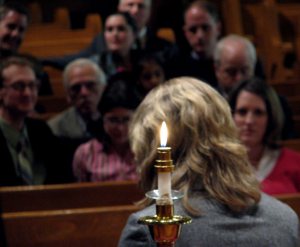 And, I'm glad I did. For, what I jewel I found in re-discovering my ordination service on DVD from November 2006. A shout out to Michelle Mesen for recording it! It took place at Calvary Baptist Church in Washington DC with important contributions from Amy Butler, the pastor, several seminary friends including Anna Kate Ellerman Shirley, Abby Thornton and Sarah Jobe as well as head of the DC Baptist convention at the time, Jeffrey Haggray, my colleague from my first church, Charlie Updike and my parents too.
And, I'm glad I did. For, what I jewel I found in re-discovering my ordination service on DVD from November 2006. A shout out to Michelle Mesen for recording it! It took place at Calvary Baptist Church in Washington DC with important contributions from Amy Butler, the pastor, several seminary friends including Anna Kate Ellerman Shirley, Abby Thornton and Sarah Jobe as well as head of the DC Baptist convention at the time, Jeffrey Haggray, my colleague from my first church, Charlie Updike and my parents too.
As I watched this service (which I hadn't viewed in many years), I couldn't help but notice the look of terror in my eyes as words poured over my life and call to ministry.
I was excited yes, about FINALLY being ordained. But, I wasn't quite sure what I was getting into. I came from a ministry family. I knew the toil would take on my life, my schedule and any future family members I added to my household. I knew I wasn't really as holy as everyone made me out to be that day. I wasn't sure how to keep pace with this emotionally draining vocation. Yet in spite of myself, I knew, though, I wanted to be in a church more than anything.
I remember the morning of my ordination I had a long talk with several seminary friends about my concerns: "I'm afraid my life is now over. I'm getting married to God today," I offered with tears in my eyes.
My friends were great, reminding me that indeed my life was not over. There's still be time for fun and holidays and new adventures even though they agreed, ordination is sort of like getting married to God (though not like our Catholic priest colleagues thank goodness!).
And so for the past six years, I've dutifully labored. I've supported two churches in associate and solo pastorate roles. I've preached a lot of services. I've planned a lot of funerals and wedddings. In doing so, I've learned much about myself, people and the role of the church in the world. People have loved me and I've loved them too. My theology has shifted and shifted some more. I've been brought back to center time and time again through the gift of colleagues.
In all of this, I wouldn't go back and change a thing. These first six years of ordination have been about serving the local church and the church has served me along the way too.
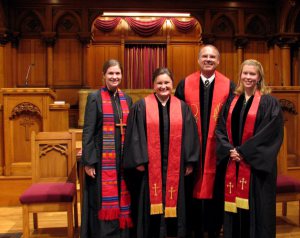 But, in January things will be different.
But, in January things will be different.
I hear folks commenting around me (when they find out I'm leaving my church), "I can't believe YOU are giving up your church." Or, "What a waste that you aren't going to be in ministry."
Such sentiments sting a little because they aren't true-- though of course my landscape of ministry is changing.
Hear this: I still am a big fan of the church. I still believe in its purpose in the world. I still will call myself a Rev. and seek to use my life in gospel pursuits.
Of course it is all going to look different soon. My calling has changed. I won't wear a stole and rise to a pulpit every week now. I won't plan worship for Lent this year. I may not make as many hospital calls.
But, I am going to still be a minister. I don't know if I could ever stop.
Someone asked me the other day, "Are you afraid of the future?"
And the answer is no.
It took me a LONG time to get to this place. But with every book I pack today, I really feel ok. The details of the ins and outs of the future life I will be creating with Kevin are sparse (I can't even tell you where I'm going to live in six months), but I realized today that I'm not afraid. I feel the gift of calling.
And in calling, I know we'll figure it out (though of course I'll have those days like everyone else when I'll cry about it). In due time, I know the Spirit will make things plain. I know I'll keep studying, learning and preaching somehow. And, most of all I will live into writing as a vocation in the upcoming season. In fact, what I get into next might just be more fitting of the person I was created to be-- who knows?
Above all, I no longer have the fearful look in my eyes I projected at my ordination service six years ago-- even though several in my life think I should be MORE scared now. God's calling is messy. Yet, it is also one of peace. This I know.
I'm glad I stumbled upon the DVD of my ordination service today. What a gift to remember and gain perspective.
November 18, 2012
Dear Washington Plaza Church family:
I come before you this morning with a heavy heart. It’s heavy because I have news to share with you that has caused me a great deal of sadness as I have thought and prayed and discerned. I need to tell you that I am sharing this resignation letter today, ending this chapter as your pastor effective on December 24, 2012.
This is sad news for all of us because we have loved each other well over these four years of life together as pastor and congregation. And, when you love someone, you don’t ever want to part ways. When you love someone, you don’t want to do anything to hurt them, to discourage them, or to cause them pain. The deep love I have for you has made this decision a particularly hard one.
But in spiritual community, which is what we’ve formed together as a church, there is something in addition to love for one another that binds us together, and that is calling. We believe that God ordains and guides all of our steps, even when what we are being asked to do is difficult. My change in status with you is a response to my changing sense of call.
It is not that I have been called to be a pastor of another church.
It is not that I haven’t enjoyed being your pastor or that there is some conflict going on in the church that you don’t know about.
It is not that I have lost my faith in anyway or am leaving the ministry. Rather, it is that I feel called into a different season of ministry beginning in 2013.
As you all know, Kevin’s new position as President of Feed The Children has caused a huge shift in our life rhythms in 2012. This new assignment came about as a result of God’s calling on Kevin’s life to lead and as he has settled into his responsibilities a shift has happened within me as well. I, too, now feel a call to use the voice God has given me to be a global advocate for children and families, for those most often ignored or in distress. I will begin to volunteer more of my time to FTC. And I look forward to spending more time with my husband in the coming months.
In addition, I believe God is leading me to grow into my writing vocation—completing a book for publication by the end of next year and pursuing new writing projects.
So, while my time as your pastor will come to an end this year know of my ongoing love and support for you as a church. I believe as strongly in the vision of who you are as a congregation as I did when I began in January 2009. You are unique in the best of ways. You are a needed witness in this community of God’s acceptance for all people. You are a collection of some of the kindest and most loving people that any pastor could hope to lead.
You have certainly moved mountains in my own life—you have made me into the woman, the pastor that I am today and will be in the future. You took a chance on hiring a 28 year old, who could have been your granddaughter, making her YOUR pastor.
By doing this for me four years ago, you gave me the biggest gifts and honors of my life—to be called your pastor. And our relationship, you have given me room to grow and explore and find my voice and for that I am and will forever be grateful.
It’s a time in our history with one another to be sad. It’s a time to walk through grief. But it is also a time to trust. You are so much bigger than who your pastor is. You are so much more than your leader. You are strong and capable of being all that God calls you to in the future.
I know this time of transition will have its own unique challenges, but believe you will face them with same grace and perseverance you have shown in facing challenges before. I will be cheering you on, treasuring the memories made in our four years together, and wishing you all of God’s most abundant blessings in your future.
With love,
Elizabeth
Yesterday, I got the word via twitter that Fred Luter, pastor of Franklin Ave Baptist Church became President of the Southern Baptist Convention, elected at their annual meeting this week.
 Such is a fact that I normally would not pay any attention to (I've long left my SBC roots since the day I felt a call to pastor), but with the election of Luter making national news (as he became the first African-American president in a mostly European American convention), I paid attention. What a noteworthy day in Baptist life! If you know anything about the history of the northern Baptists (now known as the American Baptists) spilt from the southern Baptists in 1845 over the issue of slavery, you know that a denomination founded on the principal of slavery now has an African-American president. No small thing at all!
Such is a fact that I normally would not pay any attention to (I've long left my SBC roots since the day I felt a call to pastor), but with the election of Luter making national news (as he became the first African-American president in a mostly European American convention), I paid attention. What a noteworthy day in Baptist life! If you know anything about the history of the northern Baptists (now known as the American Baptists) spilt from the southern Baptists in 1845 over the issue of slavery, you know that a denomination founded on the principal of slavery now has an African-American president. No small thing at all!
Are times changing in the SBC?
While yes, in many ways, they are. Luter's election comes, though 17 years after SBC leaders finally apologized to their African-American brothers and sisters for the convention's sins of blessing slavery. It seems that as far as racial issues are concerned the SBC wants to chart a new course. It's a slow-moving train toward racial reconciliation, but at least the train is moving in the direction of equality. Luter seemed to be just the pastor to take the convention to this historic place.
But, all of this mean what?
From where I sit as a pastor of an American Baptist congregation of diverse membership in Northern Virginia, I applaud the SBC's progress. My African-American members do too. But, I fear this is a small step, many years too late. SBC has such a public relations disaster on its hands with leaders like Richard Land spouting out racial comments in recent weeks, resolutions being passed that demean one half of its membership-- saying that women are to submit to their husbands and not hold leadership positions in church in the past several years, and fundamentalist ideas about scripture which make no room for grace described every Sunday from pulpits. (And this is not even to mention our gay brothers and sisters in Christ who in the eyes of the SBC are non people). Southern Baptists after all are often know more for what they are against than what they are for.
The future leaders of the church whom I interact with on a weekly basis in my congregation really have little to no patience for such foolishness. They want to know that God loves them, even when they mess up. They want to know that all their friends are welcome at church. They want the creative wind of the Spirit to blow through their gathered community with fresh interpretation of the scriptures for their life. Even more so, it is almost always a distasteful comment to say you have any personal association to the SBC in the circles I run in. Church abuse of all kinds still wounds hearts and lives of the faithful from this family of the Baptist faith. These are the kind of people who show up on Washington Plaza Baptist's door each week and we try to help them.
To Rev. Fred Luter, I say congratulations. May God bless your future ministry and leadership with the convention. May God guide you and make the light shine on your future work. But, I fear, my colleague that you are steering a ship that is already sinking-- being the first African-American president or not. There are problems greater for even one man to fix, no matter how great you are Rev. Luter.
Will this history making election, will the SBC change? Only time will tell. We all hope for the best.
When the World Doesn't Look the Same
Easter 2012: Mark 16:1-8
I don't know if you are like me, but when I make my choices in entertainment, especially in movies, one of my favorite weekend pastimes, there is only major requirement I have.
And that is: I like a good endings. I hope for loose ends tied up. I want an ending where I feel like the story I've invested my 10, 12 or in some cases $15 was well spent. The alternative to this often is frustrating isn't it? Investing hours of your time into a storyline, only to be disappointed in the end that you don't know what happens! Stories that don't end in the imprisonment of all the bad guys, kissing and making up for all the "they are so perfect for each other couples" and the most hopeless of characters coming to their senses and making some good choices: I simply don't like them.
 We go to movies to escape the drudgery, the monotony and the unsettling parts of our lives and so "happy endings" in somebody else's life seem to be such a big part of it. Without all plot lines settled in the end, we feel gypped.
We go to movies to escape the drudgery, the monotony and the unsettling parts of our lives and so "happy endings" in somebody else's life seem to be such a big part of it. Without all plot lines settled in the end, we feel gypped.
In the same spirit, if we came to church this Easter morning hoping for a proclamation of the gospel where all was well in paradise, where we get the 100% perfect happy ending that we've been waiting for throughout the Lenten season, I have sad news for you. In Mark's account of the resurrection story, we don't get it. We are left with a cliff hanging end of unforeseeable proportions. Without some further exploration of this text, we might feel like we are missing our Easter ending too.
Though we read of the stone being rolled away, Jesus not being in the tomb and the angel appearing to the women saying, "Do not be alarmed, you are looking for Jesus of Nazareth, who was crucified. He has been raised; he is not here" which calls for us to shout words of joy, "Christ is risen. Christ is risen indeed" Mark's account gives us no tidy ending. In fact, we are left with response that most preachers like to avoid at the end of verse 8. The women, who heard, the news, "went out and fled from the tomb, for terror and amazement had seized them; and they said nothing to anyone, for they were afraid."
Though there's this amazing, all-inspiring story of Jesus not being in the grave and an angel, yes dressed in a white robe telling Mary Magdalene, Mary the mother of James and Salome that Jesus was not there. . .
And though the good news that Jesus had been predicting all along in his years of teaching and preaching-- that yes, I'll be crucified but on the 3rd day, I'll arise from the grave-- is coming true . . . Christ is risen (Christ is risen indeed).
And though the women are told specifically in verse seven, "But go, tell his disciples and Peter that he is going ahead of you to Galilee; there you will see him, just as he told you" and are given everything they need to take the next step . .
Scripture tells us that the women do nothing. They do nothing. For it is in terror and amazement of what has happened that these women say nothing.
Jesus does his part. The angel did his part. And the women were given the opportunity to respond and follow the orders. But they don't.
And for this reason, all seems lost. All seems ruined. How about this story for a happy Easter, celebration! It is a real downer, right?
Seems like a complete sour kind of ending doesn't it?
Such is why countless translators through the years have sought to insert an alternative ending to Mark chapter 16. If you have your Bible with you open it to Mark 16 now (or if not make a note to do so when you go home today). What you will notice is the presence of section of scripture that is known as the "alternative ending."
And though most of Bible translations contain these sections, almost all Biblical scholars agree that the addition of Jesus' resurrection appearance to Mary Magdalene, to the two believers traveling along the road, the giving of the Great Commission and the ascension story were all most likely added 200 years later. For none of the earliest gospel manuscripts contain them. In fact, if we study the original Greek as it flows from verses 1-8 and then verses 9-20, we find distinct changes in tone and tense of verbs. All in all, in all thoughtfulness, we can assume that Mark meant to end his gospel at verse 8.
But what a shame! It would be so much easier to have verses 9-20 to get the happy ending that we all crave. It would be nice to have the later commentary on the story because it wouldn't force us to talk about resurrection in terms of how the women experienced it-- in terror and amazement.
It seems so un-church-like doesn't it to think about Easter in this way? Shouldn't have the women been shouting, "Christ is risen! Christ is risen indeed!" to all their friends? Shouldn't they been overjoyed to share Jesus, their teacher wasn't dead? Shouldn't have they been able to recognize in an instant how this proclamation was going to change their lives-- for if Jesus had conquered death, didn't that mean something good for them too?
But none of this was clear. None of it.
And although some Biblical commentators want to stop us at this point and make parallels between the response of the male disciples (all of those guys who fled the scene and didn't stay with Jesus at the cross) and the female disciples (saying, hey the women messed up too-- see women weren't up to the task of following Jesus either)-- I believe all of this thinking completely misses the point.
Because, really the resurrection was a lot to take in. More than these women could have ever imagined on the adventure of following Jesus.
I ask you this morning-- have you ever had an experience in your life that surprised the heck out of you? I mean, really, really surprised you in a mind-blowing, "I never saw this coming" kind of way? An experience that maybe you hoped for or even prayed for but never thought in a million years would actually come true?
Well, if you have, then, I believe that you understand how truly bewildering it was for the women to find the empty tomb that earl y morn.
y morn.
Sure, they'd heard Jesus mentioned this was going to happen. Sure, maybe even they'd been around at the home of Mary and Martha when their brother Lazarus was raised. But, deep in their hearts, it was hard to believe that such was going to happen to their beloved teacher and friend. No, Jesus couldn't rise again. No way! Resurrection wasn't natural. No way. Death was a final event after all. We are born, we live and we die. It is just what human beings do. How could Jesus not be in the tomb?
Eyes crusted over. Hair uncombed. Shoes on but going through the motions of walking yet not quite sure where they were going. Tears stains still on their cheeks. Tears in their eyes ready for water works to pour at anytime as the simplest of words of memories ever-present to set them off again. The flood of shame, of uncertainty, of anger of loss: why did this happen to their Jesus?
They were lost in a sea of unanswered questions, of last words that should have been said, that needed to be said. They were caught up in the power of grief as it came to strike them and sought to bury them too in pain that was more than they knew how to bear.
Of course they were in shock. So of course they were afraid.
One commentator even unofficially diagnoses the women with what we know in modern times as post traumatic stress-- both from the trauma of the crucifixion and of the jarring news to their tear stained faces that indeed Jesus was not there. Christ is risen. Christ is risen indeed. It was such good news that they just couldn't take it all end. The women were speechless.
If you happen to be a fan of YouTube, you might already be familiar with a video of Sarah Churman that has gotten millions of hits since its posting in September of last year. Sarah was born with a rare genetic deformity that means she’s missing the hair in her inner ear that transmits sound to the brain. She was fitted with her first hearing aid at age 2, but even with that technology she could only hear some vibrations and loud noises. She compensated throughout her life by becoming adept at reading people’s lips. She’d worked so hard to compensate in other ways; the thought of being able to hear just seemed out of the realm of possibility
But in late 2011, Sarah was fitted with a device called the Esteem Inner Ear Stimulator, an implantable hearing aid for the specific kind of hearing loss Sarah suffered. On the popular YouTube video, you can see a video of Sarah Churnam hearing for the very first time at age 29.
I have to say that it is quite moving to watch. As Sarah hears for the very first time her own voice: her laugh, her tears, the sounds of others around her, it's a reality she never could have imagined, not under any circumstances, not in any amount of time. Not in her wildest dreams did she ever believe such would come true, but it does. And in response, she weeps. And weeps and weeps.
Imagine hearing for the first time the sound of her husband. Imagine hearing the chatter of your child for the first time. Imagine all of this.
And when it happens, Sarah is stuck dead in her tracks for minutes, upon minutes. Smiling. Full of joy but paralyzed to move toward anything at first. Sarah's life would never be the same.
And, likewise, paralyzed in their tracks too the women who heard the news of the resurrection were overwhelmed too. Everything they knew, believed and staked their lives on? changed.
Resurrection of their Lord begged them to consider. What if Jesus was the real deal: God with us? What if Jesus' healings all those years had really come from God? What if the kingdom of God, the abundant life they'd be hoping for was real?
Resurrection clouded their view from what had always been. Resurrection shifted their gaze from their own pain to what God could do in their pain, how God could restore their broken spirits. Above all, resurrection meant they were going to have to spend some time re-learning the stories on which they'd based their life.
What if the end was not the end?
What if new life could come from the most unlikely of places?
What if God could be trusted to care, and protect and guide them their entire life through and beyond too?
And, what if God trusted them so much and all of the Christ followers to come-- like us-- to keep the story going?
What if the ending was not about Jesus saying or doing this or that, but people like us being a part of the world not being the same?
Then, if resurrection was real, everything was going to have to change. No more shrinking into the back of the crowds. No more taking the worst news at face value. No more being a second class citizen. No more being exclusive of people who looked just like them. No more. In resurrection the world did not look the same.
And, though the ending of Mark's gospel is still an unresolved cliff hanger, so we want to ask ourselves, what did the women do next? How long were they afraid? How long did they not say anything to anyone? With our 2000 year plus perspective, history tells us the rest of the story. And the rest of the story is that we know the story. We know the story because eventually they did tell the story. And upon each telling and re-telling of the good news: "Christ is risen; Christ is risen indeed" the world never looked the same. We are living the story now.
I know this morning, I'm telling most of you a story that is not unfamiliar to you at all. In fact, you hear it every year. You've sure got Jesus is risen thing down. You know it well. You could recite it to a friend easily, just like I did with the children sermon this morning.
But, what I wonder is resurrection real for you, more than just a word that floats off your tongue in the spring time? I need to tell you today that resurrection, my friends, is not a noun and just an excuse to have a holiday celebrate, but it is a verb that asks of us action. And it is a verb that is meant to be inserted into the sentences of our lives not only on days like today but throughout all the moments of our lives.
We are called to action because of the gift of the resurrection. We are called to the action of being storytellers of the change. To be active bearers of this good story to our families to our friends, to our communities, to anyone who will listen.
At times, this story as each and everyone one of us experiences it, is going to overwhelm us. Sure, we might just have to be quiet for awhile in awe of what life altering news might do to our plans. Sure, we might even have to do some running away from time to time to get the enormity of emotions out of our system so we can begin to act on what we see and feel.
But, regardless our call is to tell. Our call is to be the story. Our call is to keep writing and writing the chapters of the gospel tale so that the goodness of Jesus Christ that we've experienced it can be experienced by others too.
Today: I tell you because of the resurrection, we've got chapters to write together, we've got a story to finish. Come again next week because we've got to live out resurrection together.
Christ is risen. Christ is risen indeed!
AMEN
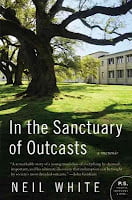 Are you sensing a theme? I love non-fiction. So, up today is another memoir that I recently stumbled upon when browsing a bookstore: Neil White's tale of his prison experience alongside a leper colony in Carville, Louisiana. I've always been fascinated memoirs, letters or other writings made by folks in prison as it usually describes a time in people's lives when they get to the heart of what it means to live, breathe and be a human being. It's cut to the chase kind of literature.
Are you sensing a theme? I love non-fiction. So, up today is another memoir that I recently stumbled upon when browsing a bookstore: Neil White's tale of his prison experience alongside a leper colony in Carville, Louisiana. I've always been fascinated memoirs, letters or other writings made by folks in prison as it usually describes a time in people's lives when they get to the heart of what it means to live, breathe and be a human being. It's cut to the chase kind of literature.
And in this case, Neil White was sentenced to 18 months for bank fraud. White lived for many years pretending if the rules of finance didn't apply to him all in hopes of making it to the top of his field. White craved praise, attention and success.
When I first began reading In the Sanctuary of Outcasts , I thought I might be soon disappointed in my book purchase. In nearly the entire first section of the book, White writes with an arrogant, self-obsessed, "I'm really not a criminal like the rest of them" attitude. He even tells his two small children as he was dropped off at the prison, "Daddy is going to camp" instead of the truth.
I was temped on several occasions to simply stop reading because the main character put such a distaste in my mouth. Who cared that the writing was so good? (It was!). I really didn't want to spend my free time learning more about him.
But all of this began to change as White got to know some of the persons struggling with Hansen's disease (or known as leprosy) who lived in this same compound of this low security prison, in particular Ella. Ella, a patient not a prisoner, spent her whole life at Carville, even after the federal mandate no longer required her to stay in isolation. And from Ella and other patients and inmates, White learns to tell the truth. White learns what community is like. He learns to say: "I did some not so very good things. I hurt myself. I hurt my family." And to his surprise, he finds acceptance. It's quite the journey! Consider this quotation:
“As I walked –“meddling’, as Ella would say- I found no simple answers. But I did find something else. The very act of being honest with myself, taking an object look at my life, was freeing….I still did not know exactly how to change, but I had discovered some simple truths: A good life with my children did not require wealth. It was vital to be honest, without worrying about my own image. And helping others was more noble than winning awards.” (212-213)
I would recommend this pick for anyone interested in a transformation story, any preacher or teacher of the Bible-- as it is a great tool to understand the modern connection of leprosy, or anyone wanting to explore the justice (or injustice of) the prison system. I'm sure the next time I preach on a text with leprosy mentioned within, I'll pick up In the Sanctuary of Outcasts and find a great illustration.
Up tomorrow: Unorthodox: the Scandous Rejection of My Hasdic Roots by Debroah Fieldman
"Will you please make my life better NOW?"
 Being a pastor, as many of us know, is a "one size fits all" kind of job filled with lots of expectations placed on our shoulders from many. People certainly want happier lives all the time. And because of this human condition, it is not unusual that we are asked to do so much more than attend to the spiritual lives of our members.
Being a pastor, as many of us know, is a "one size fits all" kind of job filled with lots of expectations placed on our shoulders from many. People certainly want happier lives all the time. And because of this human condition, it is not unusual that we are asked to do so much more than attend to the spiritual lives of our members.
If my colleagues' weeks are anything like mine, folks regularly want to chat with me about everything from martial relationships, how much money is in their bank accounts, their health, and/ or how they feel our church is or is not meeting their social/ emotional needs. Practically, on a given week, I could be found driving someone to a doctor's appointment who could not find a ride otherwise, talking with a struggling single mom about where to get assistance to pay some of her past-due bill, or even taking calls from the social workers of some of our mentally challenged church members about her developmental progress. This is all outside that sermon that always must be prepped and ready by Sunday at 11 am (you know, what folks think is our main job). Though we know that being "all things to all people" is an impossible task and equipping the people of God for the work of ministry is our ultimate goal (i.e. pastors do not do all the work themselves or alone), this does not change the expectations others seem to pile on us week in and week out. Fair or not, it is just the way it is. Sometimes folks, I find, just need someone to blame for their unhappiness in their life and the church and its leadership is an easy scapegoat.
Sometimes we are told as pastors:
If you would just preach a clearer 3-point sermon, then I'd know God's will for my life.
If the church would just start a new ministry for people in my life situation, then I wouldn't be as lonely anymore.
If the pastor had just visited my mother-in-law at the hospital one more time, then she wouldn't have been so discouraged.
"Will you please make my life improve and improve now?" Such pastoral shoes are heavy ones to put on sometimes. Sometimes pastors and the churches they serve feel as helpless to improve the quality of life of its congregants simply because of ALL of the responsibilities before us. It certainly can be overwhelming without lots of prayer.
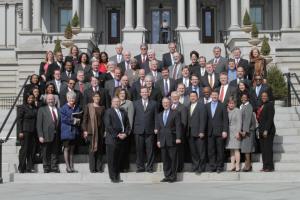 With all of this being true, I found myself listening to the White House staff I met with this week differently. As part of a 60+ member delegation to converse with White House staff via an invitation from Associate Director of the Office of Public Engagement, Paul Monteiro, I sat before some of the most hard-working and most severely criticized public servants in the country. On topics of concern including the environment, human trafficking, housing, credit and immigration, our pastoral delegation listened and dialogue back with the staff about concerns stemming from our "front line" experiences of ministry. A civil and respect-filled encounter existed between us, I am proud to report. However on countless occasions, questions from the pastors to the staffers came in the form of "I wish that the Obama administration could do more on this . . ." This line of questioning felt like a broken record that went on for the duration of the three-hour meeting. We all wanted our government to do MORE. We hoped our government would fix more of our deepest brokeness as a nation. We wanted change soon, and as soon as possible. And as I listened, I couldn't help but whisper to my colleague, Rev. Abby Thornton sitting beside me, "I want to say to these White House staffers, I know how you feel."
With all of this being true, I found myself listening to the White House staff I met with this week differently. As part of a 60+ member delegation to converse with White House staff via an invitation from Associate Director of the Office of Public Engagement, Paul Monteiro, I sat before some of the most hard-working and most severely criticized public servants in the country. On topics of concern including the environment, human trafficking, housing, credit and immigration, our pastoral delegation listened and dialogue back with the staff about concerns stemming from our "front line" experiences of ministry. A civil and respect-filled encounter existed between us, I am proud to report. However on countless occasions, questions from the pastors to the staffers came in the form of "I wish that the Obama administration could do more on this . . ." This line of questioning felt like a broken record that went on for the duration of the three-hour meeting. We all wanted our government to do MORE. We hoped our government would fix more of our deepest brokeness as a nation. We wanted change soon, and as soon as possible. And as I listened, I couldn't help but whisper to my colleague, Rev. Abby Thornton sitting beside me, "I want to say to these White House staffers, I know how you feel."
Of course, my work in my congregation is on a much, much smaller scale, but the expectations and the constant "fix me" is something I do understand. And, I am sorry that my those who we elect to serve or are appointed to serve us in government have to feel this way too. I can't imagine what it is like to meet with citizens day in and day out receiving little praise for the good work you are doing instead being surrounded by voices that must sound like that of needy preschoolers who constantly ask their teachers for "Help me now! More, more!"
For, while we all have power to lead change, especially in positions of leadership, none of us are saviors, none of us are miracle workers. I know no matter who we elect to the executive office, he or she can not ever address every problem we face as a nation and as global citizens either. I also know that no matter how prepared, studied up or experienced in a multitude of situations as a pastor, I can not save my congregation from their deep woes either. Only God can.
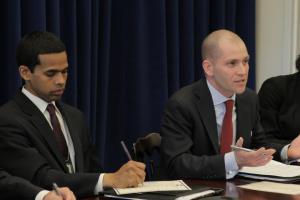 While it is easy to want to expect the impossible from our government leaders, I hope I will think with more compassion the next time I'm in a conversation that begins with "I wish this administration would do . . ." There's more work, great work to do, of course, but we also must remember the people behind the scenes are just people after all. Like pastors, they can only do so much.
While it is easy to want to expect the impossible from our government leaders, I hope I will think with more compassion the next time I'm in a conversation that begins with "I wish this administration would do . . ." There's more work, great work to do, of course, but we also must remember the people behind the scenes are just people after all. Like pastors, they can only do so much.
As a citizen as of this democracy, if I want to complain, I need to be willing to do something about the change.
And, I know the same is true of churches across our land. If you don't like what you see, do something about it: be a part of the solution, not just the complaint. Like Gandhi once said, "Be the change you want to see." And, so let's get to work, all of us.
 Here we are, already deep into Lent preparing for the second Sunday of the season this week. Yes, even Baptists (at least some of us) celebrate it too.
Here we are, already deep into Lent preparing for the second Sunday of the season this week. Yes, even Baptists (at least some of us) celebrate it too.
Is Lent all about just giving something up and not cheating? Is Lent just about restraining words of exclamation, “Allueias” in worship? Is Lent just a time of confession and repentance where we come to church to feel bad about ourselves? Or is it something deeper?
Growing up in a tradition that did not celebrate Lent (lent to me was that fuzzy stuff you find in the dryer) still feel the observance of this season is seeping into me. I know I"m still figuring it out. Afterall, Lent is something that you practice.
The first year I observed Lent, right after graduating from college, I acted as though the Lent disciplines were a race. Forty days of self-sacrifice: "Game on!" I said. I gave up soda that year and as much as I really wanted to cheat, I abstained day after day with hopes of finishing strong and satisfied with “accomplishment” of Lent on Easter morn. But, the more I’ve practiced and preached about Lent, these past several years, I’ve realized that words like “accomplishment” or “sacrifice” are not as much about “Lent” as we might have thought.
This year as a corporate community at Washington Plaza, we are observing Lent with the theme “Promises in the Night: Sitting with Jesus in the Dark Night of the Soul.” In worship we’ll be combining gospel readings about the last days of Jesus on earth with some of the most hopeful promise texts of the Old Testament as a way of sitting with Lent in a new way this year. We’ll consider the darkness because we’ve all been to the darkness, if we aren’t sitting with it right now. This week's promise is: "I wil remember you."
So, besides encouraging you to come to corporate worship as often as your schedule allows (in Reston or wherever you are)—to explore ideas of promises, darkness and waiting with one another’s soul: I also want to challenge you to not try to conquer Lent this year. No matter what your Lent practices may be let this be a year that we simply sat with Lent. Let us not hurry. May we claim that the darkness as ok, for a time. Let us not be afraid. Let us simply allow the promises of God arrive through cracks, bit by bit. I believe if we do so, by time we get to Easter, there’re be quite a party going on at the church on the Plaza (and elsewhere) because the joy of our light will overflow!
"From ashes you came and ashes you shall return." Let Lent tary on.
 When I first arrived on the scene as Pastor of Washington Plaza almost three years ago now, I was handed a stack of files to read to get to know the church a little better. Though a common practice-- often it is what occurs with any professional during their first week of work at any job-- I was a bit overwhelmed as I began reading. I wasn't sure what I had gotten myself into.
When I first arrived on the scene as Pastor of Washington Plaza almost three years ago now, I was handed a stack of files to read to get to know the church a little better. Though a common practice-- often it is what occurs with any professional during their first week of work at any job-- I was a bit overwhelmed as I began reading. I wasn't sure what I had gotten myself into.
Within these files I found on my desk, I uncovered more details of the story of the church that had been-- ten, five and even just a couple of years before my arrival. It was a story of conflict. It was a story of misunderstandings. It was a story of theological differences among the members that couldn't seem to be resolved except in a stance of "us vs. them." It was a story about a community of people not fully living up to their God-given potential.
But, for as much I knew that for any organization to be on a path toward growth and vitality the emotional and toxic stuff had to get out, reading over the files made me sad. I could hardly stomach it. I could tell I was already learning to love them and they were such amazing people who had been through a hurricane of church conflict in their history, but they weren't bad people. It pained me to see the reputation of the church from the past continue to cause pain in the present. They deserved better.
Though no Pollyanna in the challenge of this re-building project I'd gotten myself into, I knew the past had to stop with me.
So, what did I do with these files during my first week? Probably I should have turned them back over to the filing system in the office for the archives. But I didn't. I held on to them. I put them where no one in the church could find them, hoping the files wouldn't be missed. Looking back on that first week now, I realize it was my symbolic gesture to say the congregation and I were beginning with a clean slate. I would trust them to be who they said they were when I was hired.
So, now fast forward almost three years, and a free afternoon that I found myself with yesterday. With no one in the hospital this week and no Advent bulletins to work on yet, I decided to engage in my least favorite and usually ignored pastoral office task: filing old papers and sermons. And, as I filed, I re-discovered these documents placed on my desk on my first week here. I paused for a minute to re-read these papers-- old newsletters, staff reports and church business meeting minutes-- and as I read, I surprised myself. I was no longer afraid. What was is no longer what is.
For by now, shared ministry and engaging community life is our norm. We've practiced together a new way of valuing every voice, thankfulness and consistency.
We don't yell at one another in church meetings, but ask thoughtful questions and trust the intentions of the leaders we've elected to see projects through. We aren't afraid to talk about Jesus or what it means to be a gay Christian or even to celebrate Advent without the Christmas hymns yet. We seek to appreciate those who serve in church leadership positions so that they don't go running out the door when their term is over. We express love and appreciation for one another in Sunday morning worship services, during lunches we share together after worship as well as the other times during the week.. We are not simply a hospital for the sick-- as has been the motto about this church in the past-- we are a place of discipleship for any to come and place deep roots.
Though we have a LONG way to go in fulfilling our mission, re-reading documents of the church's history encouraged me that we are in the process of living out our dreams.
After three years, I was ready to let go. The files are in the archives as of this morning. I no longer cared who saw them.
The old is gone and the new is on the horizon of becoming. I'm glad some paper shuffling in my office reminded me of this truth again.